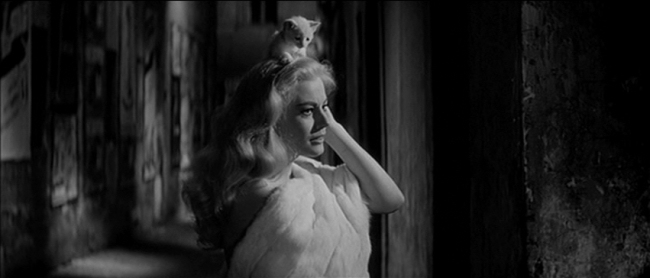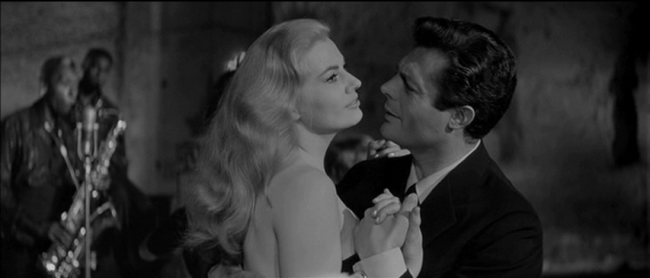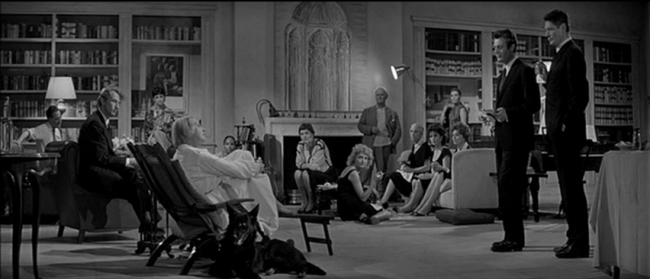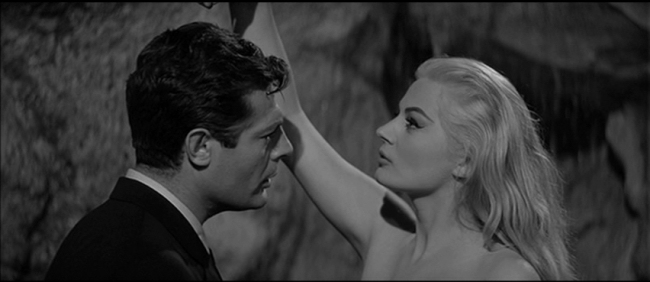The Abundantly Sweet

It felt like a good time to watch La Dolce Vita again. In Federico Fellini's 1960 masterpiece about tabloid culture that avoids any canned, lazy morality, he portrays the peculiar mixture of the notoriously shallow with a fervent pursuit of the truly divine.

The film's almost three hours long but when most people think of the film, especially people who haven't seen it, they think of the relatively short segment starring Anita Ekberg, particularly her famous dance in Rome's Trevi Fountain. In the film, her only audience is Marcello (Marcello Mastroianni) and a kitten. A writer for gossip magazines who undergoes a personal struggle throughout the film between pursuing a world of glamour and a world of intellectual stimulation, Marcello tries to tell Sylvia (Ekberg) what she means to him earlier in the film as they dance together.

"You're everything, Sylvia. You know that you're everything?" he tells her in Italian clearly beyond her grasp of the language. "You're the first woman of creation. You're the mother, the sister, the lover, the friend . . . the angel, the devil, the Earth, the home. That's what you are: the home!" And yet he barely knows her. His veneration for her quickly eclipses interest in her alcoholic and abusive fiance, Robert (Lex Barker). Marcello doesn't see Robert hit Sylvia--and Marcello doesn't seem to care when Robert hits him. Probably for the same reason he's losing interest in his own lover, Emma (Yvonne Furneaux).

He's cold and barely seems to listen to Emma when she argues with him in the car, as she tries to tell him that he already has the greatest thing, a real woman who loves him. But the film isn't simply a tale about a man losing his soul to something empty in exchange for a real relationship. We see Emma herself joining in a mob of people tearing apart a tree in a grotesque scene where two children falsely report seeing the Madonna. Is Marcello's distraction a sign of his shallowness or part of a realisation that his relationship with Emma was based on a shallow foundation? A seemingly wise old woman, a poet, advises him never to marry, always to be free.

This is at Steiner's (Alain Cuny) party--a man who jokingly describes himself as the devil earlier in the film when he talks about how a priest allows him to play the church organ. It's Steiner's social circle of artists and intellectuals that entices Marcello away from decadence--it's after Steiner murders his children and kills himself that Marcello fully gives into the orgiastic lifestyle. How do you connect Marcello riding on a woman's back like a horse at the end with the scene of horror that preceded it? One of the appeals of free ranging thought is that you don't know where it will go but Steiner, as the ultimate representative of that lifestyle, who earlier described his deep affection for his children, presumably followed that path somewhere horrible. Perhaps it is better to follow an idol than to question everything.

Anyone who denies the beauty of the fountain scene is very far gone down the path of cynicism. Those who would dismiss it as an exercise of the "male gaze" would miss the point. The heterosexual male attraction to women's bodies is only a convenient path to something bigger. Compare the quote from Marcello above with Reese Witherspoon talking about Oprah Winfrey at this year's Golden Globes: "And her hugs, Oprah’s hugs could end wars, solve world peace. It’s like your oldest, dearest friend has just seen you after the longest journey of your life--it’s that good. When she hugs you, it’s the greatest thing ever." This sounds silly to those of us who aren't fans of Oprah but to those who are it's a natural confirmation of the veneration they feel. One might say that Oprah works more to create her image, is more of an artist, but this would be a too typical reflection of how people underestimate the work an actor actually does.

Sylvia is very much involved in creating art, using her body as an instrument. We constantly see her making creative decisions--her refusal to remove her glasses for a reporter when she gets off the plane, her announcement that she's taking off her shoes at the party, her insistence that the music change from jazz to rock. Like many great artists, her impulse to create art continues even in the absence of an audience--she puts the kitten on her head when even Marcello isn't there to see her. And, of course, it's her decision to walk into the fountain. Is it because she's feeling too warm? No, she describes the fountain as beautiful and that's when she wants to enter it and become a part of it. The fountain is itself a great work of art, much as a film is a work of art, and Sylvia walking into it is not unlike signing up to be part of a film.

It's important to acknowledge the power in beauty to have a real conversation about the destructiveness of decadence. In the final party scene Marcello is compulsively critical and abusive and has lost his ability to communicate with the normal girl from the cafe who tries to say something to him from across the water. By this point, Marcello is lost in the world of beautiful party goers and the strange dead sea creature washed ashore.
Twitter Sonnet #1077
Through ancient phones the call remade the shot.
In tracing tape the duct refused the air.
The vision net withheld the optic spot.
The banished fish'll take a water spare.
A quoted man addressed the shouting lamp.
The audience ashore divides the book.
The pictured woman hailed the running champ.
Between the boats the cups'll have to look.
Hamburger ash despairs of mustard gas.
They want to trap the ferns beneath the branch.
A mashing tool prepared the spudded pass.
Decision tubers led us to the ranch.
Ingredients and stars configured right.
Galactic catsup stills to whiskey night.